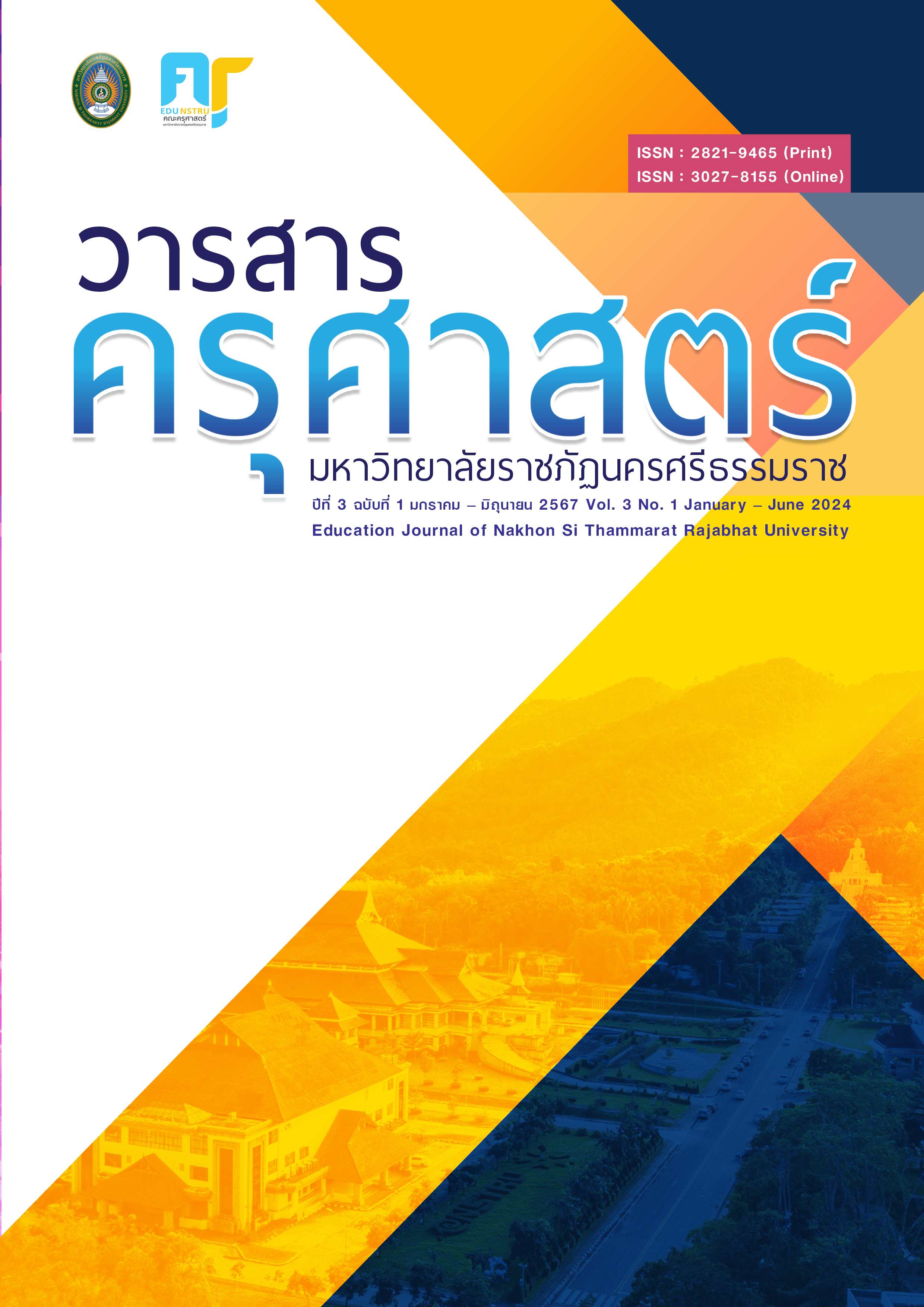การพัฒนาผลการเรียนรู้วิชาสังคมศึกษาและการคิดวิเคราะห์ โดยใช้การจัดการเรียนรู้ แบบสถานการณ์จำลองและแอพพลิเคชั่น TikTok เรื่อง หน้าที่ของเยาวชนต่อสังคมและประเทศชาติ ของนักเรียนชั้นมัธยมศึกษาปีที่ 1 โรงเรียนโยธินบำรุง
Main Article Content
บทคัดย่อ
การพัฒนาผลการเรียนรู้วิชาสังคมศึกษาและการคิดวิเคราะห์ โดยใช้การจัดการเรียนรู้ แบบสถานการณ์จำลองและแอพพลิเคชั่น TikTok เรื่อง หน้าที่ของเยาวชนต่อสังคมและประเทศชาติของนักเรียนชั้นมัธยมศึกษาปีที่ 1 โรงเรียนโยธินบำรุง เป็นการวิจัยเชิงทดลอง โดยมีวัตถุประสงค์เพื่อ 1) เปรียบเทียบผลการเรียนรู้ของนักเรียนก่อนและหลังได้รับการจัดการเรียนรู้แบบสถานการณ์จำลองและแอพพลิเคชั่น TikTok 2) ศึกษาการคิดวิเคราะห์ของนักเรียนในการจัดการเรียนรู้แบบสถานการณ์จำลองและแอพพลิเคชั่น TikTok และ 3) ศึกษาความพึงพอใจของนักเรียนต่อการจัดการเรียนรู้แบบสถานการณ์จำลองและแอพพลิเคชั่น TikTok กลุ่มตัวอย่าง ได้แก่ นักเรียนชั้นมัธยมศึกษาปีที่ 1 โรงเรียนโยธินบำรุง ภาคเรียนที่ 1 ปีการศึกษา 2566 โดยการสุ่มแบบกลุ่ม โดยมีห้องเรียนเป็นหน่วยการสุ่ม จำนวน 1 ห้องเรียน จำนวนนักเรียน 28 คน เครื่องมือที่ใช้ในการวิจัย คือ แผนการจัดการเรียนรู้ แบบทดสอบ แบบวัดการคิดวิเคราะห์ และแบบวัดความพึงพอใจในการจัดการเรียนรู้ สถิติที่ใช้ในการวิเคราะห์ข้อมูล คือ ค่าเฉลี่ย () ค่าเบี่ยงเบนมาตรฐาน (S.D) และ t-test Dependent
ผลการวิจัยพบว่านักเรียนมี 1) ผลการเรียนรู้หลังเรียน (= 12.42, S.D. = 0.74) สูงกว่าก่อนเรียน (
= 7.50, S.D. = 1.85) อย่างมีนัยสำคัญทางสถิติที่ระดับ .01 2) ผลการคิดวิเคราะห์ คะแนนเฉลี่ย 3.95 อยู่ในระดับดี และ 3) ผลความพึงพอใจในการจัดการเรียนรู้ คะแนนเฉลี่ย 4.25 อยู่ในระดับมากที่สุด
Article Details

อนุญาตภายใต้เงื่อนไข Creative Commons Attribution-NonCommercial-NoDerivatives 4.0 International License.
บทความที่ได้รับการตีพิมพ์เป็นลิขสิทธิ์ของวารสารครุศาตร์ มหาวิทยาลัยราชภัฏนครศรีธรรมราช
ข้อความที่ปรากฏในบทความแต่ละเรื่องในวารสารวิชาการเล่มนี้เป็นความคิดเห็นส่วนตัวของผู้เขียนแต่ละท่านไม่เกี่ยวข้องกับวารสารครุศาสตร์ มหาวิทยาลัยราชภัฏนครศรีธรรมราช
เอกสารอ้างอิง
Khaemmanee, T. (2023). The science of teaching knowledge for effective learning process management. (26th ed). Bangkok: Chulalongkorn University Publishing. (in Thai)
Mano, K., Satiman, A., Jareanjittakom. S. & Boonlue., S. (2021). The development of application for education by with kwl plus technique on readingfor main idea, thai language subject to enhance analytical reading ability for prathomsuksa 3 elementary school students. Journal of Education Silpakorn University, 19(1), 68-88. Retrieved from https://so02.tci-thaijo.org/index.php/suedujournal/article/view/245068 (in Thai)
Pooltawee, T., & Tantichuwet, P. (2021). The Development of Learning Achievement and Satisfaction through Inquiry-based Learning (5E) combined with Refraction Simulation for Grade 9th Students. Journal of Education and Human Development Sciences, 2(5), 52-65. Retrieved from https://kuojs.lib.ku.ac.th/index.php/jehds/article/view/4623/2228 (in Thai)
Thongkum, N. (2019). Participating the Instructional Innovative Inventories with the Simulation Based Learning and Application for Education Methods for Developing Students' Learning Achievements at the 11th Grade on Light and Telescope Issue in Physics Class (Master of Education (Science Education)). Rajabhat Maha Sarakham University. Retrieved from https://fulltext.rmu.ac.th/fulltext/2562/M126859/Thongkam%20Nawapon.pdf (in Thai)
Likert, R. (1987). The Method of Constructing and Attitude Scale. New York: Wiley& Son. Retrieved from https://www.sfu.ca/~palys/Likert-1933-TheMethodOfConstructingAnAttitudeScale.pdf
Thongphuak, P. (2018). Effects of economics instruction by using simulation games on financial literacy of upper secondary school students (Doctor of Education), Bangkok: Chulalongkorn University. Retrieved from https://cuir.car.chula.ac.th/handle/123456789/61393 (in Thai)


